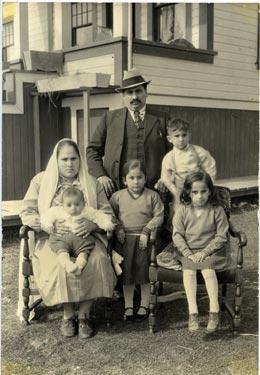South Asian Pioneers: Mayo Singh and Bishan Kaur

Mayo Singh was born in 1888 in a Punjab village called Paldi, a name that would ultimately bring him a measure of fame and fortune in his adopted country of Canada. At 17, he traveled to B.C. to join his older brother, Ganea, already working at a sawmill in Chilliwack. Mayo worked for nine years as a lumber stacker before forming a partnership with 34 others from the Punjab to purchase a small sawmill of their own.
In 1916 he went on a scouting trip to the Cowichan Valley seeking a better source of timber and a suitable site for a mill. He settled on the area because of its proximity to the E&N Railway and a creek that could be dammed to form a millpond. During the first years of operation, Mayo Brothers Timber Company (later, Mayo Lumber Company when Mayo became the sole owner) survived several mill and forest fires. But the company eventually thrived, creating a community around it, first called Mayo, after its founder, with a Sikh temple, a school, company store, post office and a Japanese temple/community hall.
Mayo had sent for some Japanese men he had worked with in Rosedale, near Chilliwack, who, along with their families, other East Indians, Chinese and whites, formed this unique community. Later, at the urging of Canada Post to change its name because it was being confused with the town of Mayo in the Yukon, Mayo renamed it Paldi, after his home village in Punjab.
In 1925, after building a large family home near his office, Mayo returned to India to marry the girl his parents chose for him. “I didn't know anything about her,” he said of Bishan Kaur. “You’re happy if you get the best. But if you don't, you have to take what you get.”
Mayo would get “the best”. Bishan spoke no English at first, but soon picked up the international dialect unique to Paldi’s various nationalities. She was described as a handsome woman, very quiet, always well-dressed and wore a big Indian shawl.
The newlyweds lived with his father before returning to B.C., where the couple had their first child, a girl, Joginder Kaur in 1927. Seven others would follow in quick succession. With the birth of each child, Mayo donated a full day’s pay to the hospital. Because of his many philanthropic gestures through the years, Mayo was regarded as a virtual Santa Claus by more than a dozen institutions in Victoria and on the Lower Mainland. There is a scholarship named for him at the University of Victoria, as well as a hospital in India and an auditorium in a college near his birthplace.
Life in Canada for Mayo and Bishan was not without tragedy, however, which perhaps explains his generous donations to local hospitals. First there was the death of his six-year-old daughter, Rajinder Kaur, who succumbed to burns from a fire. Then Joginder Singh died of spinal meningitis.
Over the years, the Mayo family home became a daily gathering place for East Indian women and children. Like her husband, Bishan Kaur is remembered for her generosity. Rajinder Kaur Manik of Duncan remembers her as saying to people, “Come to Paldi! My husband will give your husband a job.”
And Mayo would more often than not follow through on that promise, putting Paldi, literally, on the map.
Source: www.mosaic-bc.ca/forestry/paldi.html
To read other stories of Indo-Canadian pioneers, download the free digital edition of the 100 Year Journey book at www.100yearjourney.com or search 100 Year Journey in the App store on your favourite mobile device.









